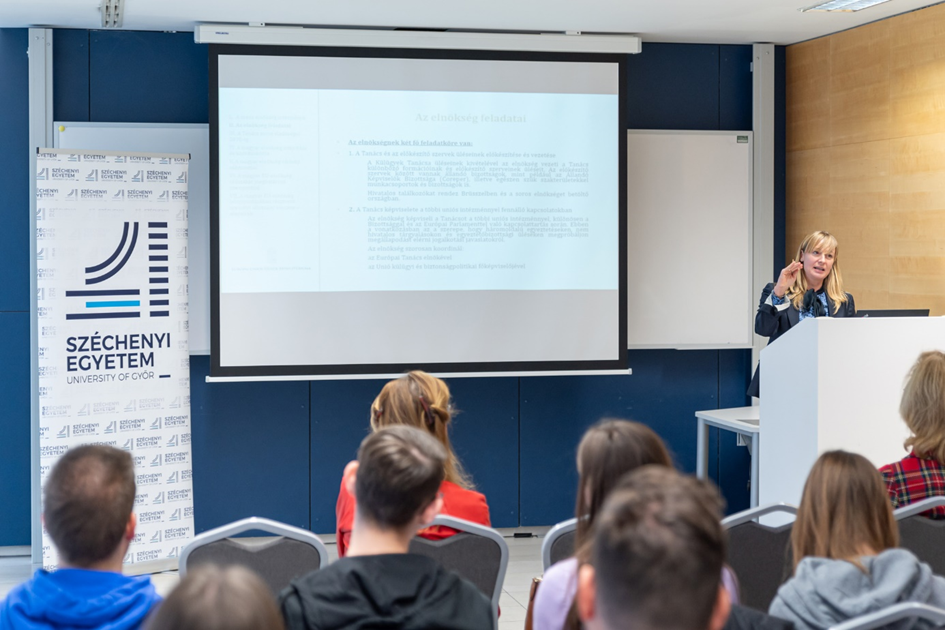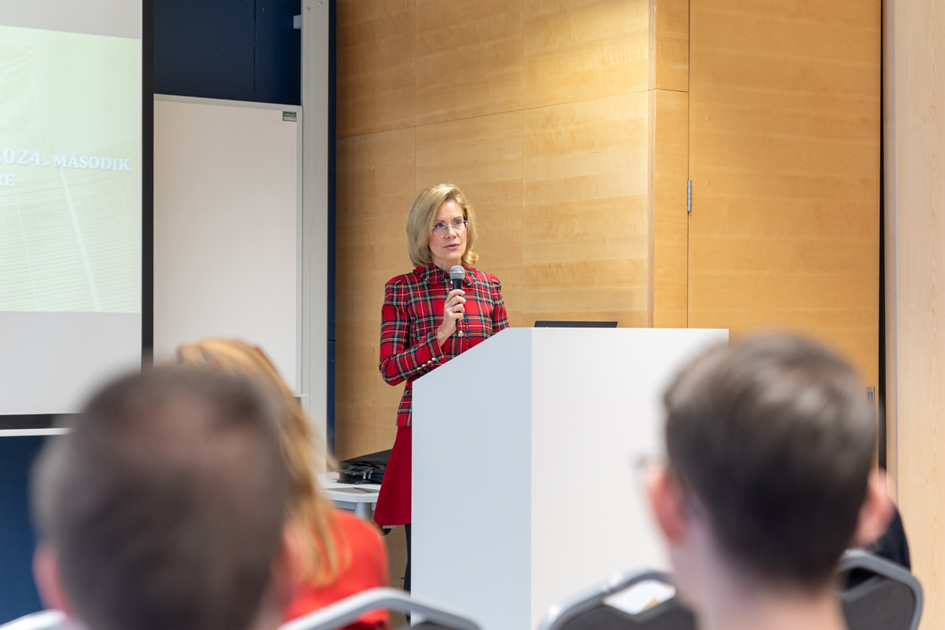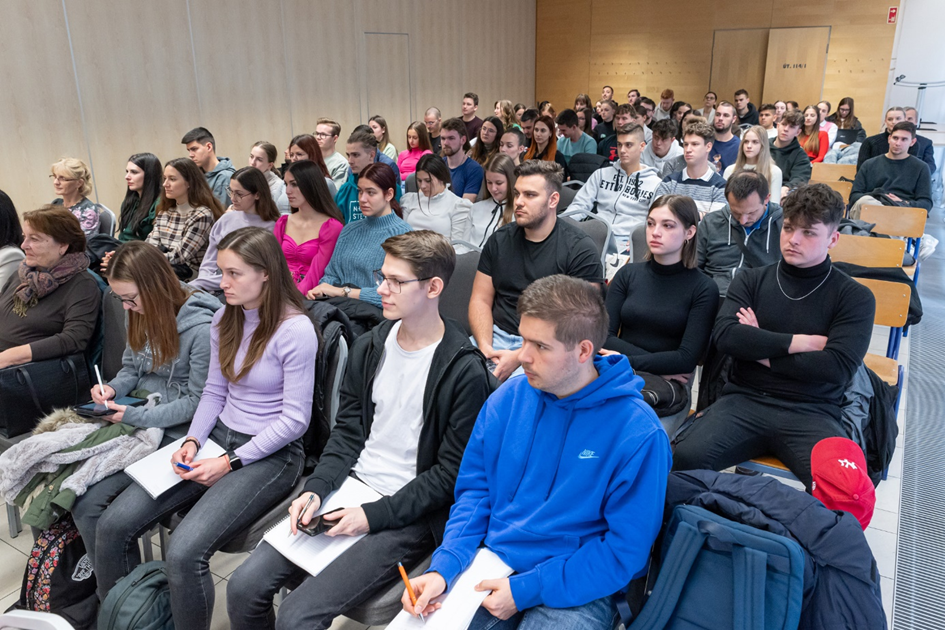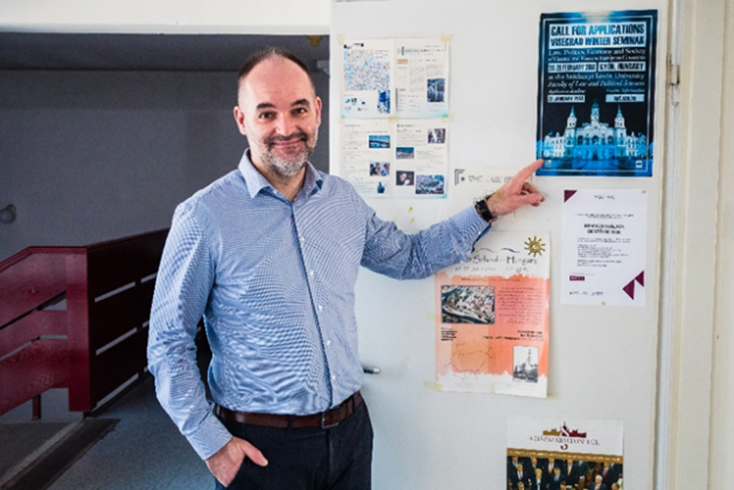Focus on role of the family at SZE panel discussion
The role of the family was discussed by participants of a panel discussion organised by Széchenyi István University at the institution's Budapest Innovation and Training Centre. The series of events, focussing on gender equality, is also in line with the UN's Sustainable Development Goals.
This year a series of panel discussions entitled Women in the Family, Society and Science was launched at Széchenyi István University’s Budapest Innovation and Training Centre. Guests of the events are women who, with their professional success and determination, can be role models for many. The first event, in January, focussed on the challenges and experiences of teleworking, the second, in February, was a video message to mark the International Day of Women and Girls in Science, with the third, in March, on women and young people in the labour market and the fourth in April, on creativity and innovation. The most recent event was on the theme of Family: strength and vocation. Renowned professionals - all of whom are mothers in addition to their careers - spoke about Hungarian family policy, the continuity of traditions, the balance between family and work, and what family means to them.
 Speakers also spoke about their personal experiences of the role of the family.
Speakers also spoke about their personal experiences of the role of the family.
(Photo: Emese Sándor)
At the event, Tünde Fűrész, president of the Mária Kopp Institute for Population and Families, who has been working on family policy for 13 years, said a positive aspect was that since 2010 attitudes have changed and it is no longer embarrassing, but rather fashionable to live in a large family. She said that the most difficult thing is to get to the point of having the first child, which is made more difficult by self-centredness and digitalisation. "It's no coincidence that today women have their first child at the age of twenty-nine on average, whereas in the first decade of the century, it was twenty-three," she said. She added that it is not easy to be a good mother or father these days, because whereas in the past we only had to love children and set an example, now we have to protect them from things we do not know well enough ourselves, because everything is changing so fast in the digital world. At the same time, parents have become more aware of the digital presence forced on them by the coronavirus epidemic. Finally, she reported on her institute's research that people who have real social relationships are happier, and that family is a source of happiness.
 Tünde Fűrész, Kata Molnár-Bánffy, Nóra Király, Nikoletta Badacsonyi-Kovács and Dr Eszter Lukács (Photo: Emese Sándor)
Tünde Fűrész, Kata Molnár-Bánffy, Nóra Király, Nikoletta Badacsonyi-Kovács and Dr Eszter Lukács (Photo: Emese Sándor)
Kata Molnár-Bánffy, owner-CEO of Salt Communications and CEO of Képmás Publishing, explained that family is a basic value in life and perhaps that is why we have not talked about it enough for a long time. Today, we talk a lot about the family in a political context, but this can be frightening for many people - so it is important that civilians and professionals strengthen the dialogue on the family as a kind of authenticating factor. Képmás Magazine can be a key platform for this. As a member of the board of trustees of the Media for the Family Foundation, one of the founders of the Mol New Europe Foundation, vice-president of the Foundation for the Community in Cluj, Romania, and as the executive director of the Carola Association, she is involved in significant NGO activity - she stressed that she considers large families to be extremely important because they are easy to become resilient in. She stressed that parenthood cannot be trivialised, that we must be authentic in every moment, but at the same time we must go easy on ourselves and our fellow parents, as we can by no means be perfect parents to the new generations.
 Dr Eszter Lukács, Vice President for International Affairs and Strategic Relations at Széchenyi István University, welcomes participants. (Photo: Emese Sándor)
Dr Eszter Lukács, Vice President for International Affairs and Strategic Relations at Széchenyi István University, welcomes participants. (Photo: Emese Sándor)

Nóra Király, a founding member of several NGOs and associations – the Young Family Club, the Daily Life through Women's Eyes Association and the Gazdagrét Association for the Unification of Families – and herself from a large family, said that many of today's young people would like to have a large family, but they are not sure whether they will be able to have children, because European trends and the pursuit of individual happiness, for example, are against them. She says mothers are often forced to juggle with their time, but we have to get to the point where women should not have to choose between work and family. She stressed that this is why government and civil society organisations, such as the state's support for atypical forms of employment, are important.



 The panel discussion was well attended (Photo: Emese Sándor)
The panel discussion was well attended (Photo: Emese Sándor)
Nikoletta Badacsonyi-Kovács, an alumna of Széchenyi István University and one of the creators and owners of the Pálos Resort in Zalacsány, winner of the Best Ethno Hotel award at the 2017 International Hospitality Awards, said that as well as the importance of patience, lots of conversations, setting an example and helping each other, work is essential, but emotional support for it comes from children, so having children clearly makes sense. She said that for family balance, grandparents, with their love and maximum attention, can provide a secure backdrop.



The programme also provided an opportunity for informal discussions (Photo: Emese Sándor)











